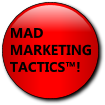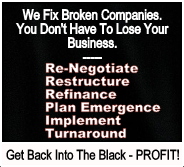You can create (or allow the proliferation of) problems in order to fuel a market for their solutions; name diseases and come up with medications; avoid getting to the root of problems and make a fortune (Splenda or Sensa anyone?) selling symptomatic remedies...and these remedies might either be addictive or create secondary problems for which profitable cures can be found and advertised.
This is not the "New Normal." This is exploitation that has been an integral component of both innovation and marketing which has in and of itself been growing. Eager marketing strategists are often in favor of creating (or at least identifying) problems to solve with new products; but it has reached a point in our marketing playbook, that its often a good strategy to stay ahead of the curve that you yourself create by promoting products which just treat symptoms, but do not ever cure -- and worse, there are some unscrupulous folks out there (they make science fiction books about it) who would create diseases, perhaps plagues -- if they could be the only ones with the cure.
If that last example sounds familiar, it's because
I came across the following article in my reading earlier, and wanted to share this excerpted link with my readers at The Mad Marketing Tactics Blog. Trust me -- you'll see why when you return to this page.
FDA rule creates standards for gluten-free food labels
The FDA has issued rules to define the term "gluten-free," saying foods with that label must contain less than 20 parts per million of gluten. Food manufacturers will have one year to comply with the regulation, which has been in the works since 2007 and conforms with rules used in the EU and Canada. USA Today (8/2), The New York Times (tiered subscription model) (8/2), Progressive Grocer (8/2), CandyAndSnackToday.com (8/4), Advertising Age (tiered subscription model) (8/2)
Scientists have been researching the facts and postulating (informally, unofficially, but loudly) that it seems that the more recent generations of children (including folks up into their late thirties) of our American society are "developing an increasing variety of food allergies and sensitivities."
There are allergies to peanuts, fruit, lactose and gluten -- and other allergies, increasing in both their number and type and in the percentage of the younger population affected. Obesity is also a growing problem [no pun intended] and people are getting ready to abandon cane sugar for artificial sweeteners that are not-too-distant cousins of toxic coal tar distillates. The cane sugar lobby has been railing at the corn sugar and corn sugar syrup-containing products market for the last decade or so, with increasing ferocity, in order to maintain sugars position as an exclusive commodity without competition in order to maintain its market share and control prices -- something like what Big Oil has done, but lighter and sweeter. And of course there's arsenic in apple juice (in almonds too, if you eat a truckload of them).
Always, as they say in law enforcement, follow the money. And if you follow it upstream, you'll find that the companies who are making a fortune in the "everything is dangerous, and has either harmed or will harm people in the future" is Big Pharma, the big food companies, and of course, the legal profession (asbestosis, and the like) and the legislators and regulators who are spawned from the legal profession.
In marketing, depending upon how unscrupulous you'd like to be, the holy grail for you is to either make a relative non-issue into a lobbying point and set some do-gooders to the task of screaming about it so that they can clear a path for you to market something new, or you can be even more innovative and outright lie about the deadly side-effects of anything and either sell information about it or sell a product to deal with it, symptomatically.
The trick is to identify problems and find solutions - that's how markets are discovered and businesses founded. A newer trick is to "create a demand" for something (in B2C marketing), and build a business around that -- in a way, branding creates a demand, and I like that.
What goes against my ethics is to avoid finding a solution to a problem -- perpetuating it and lobbying about it -- and only offering symptomatic relief when a cure could be found, and where some of all of these unethically-derived profits might be rightfully, albeit voluntarily, be invested after enough low-hanging fruit have been harvested and squeezed.
The title of the article says it eloquently: Creating Or Finding Problems To Create Markets - "Don't Cure The Disease. Treat the symptoms!"
Thank you for reading and Re-Tweeting to your social media networks.
Douglas E. Castle at http://DouglasECastleBlog.com (the NEW professional blog) and at http://www.DouglasECastle.com (the old personal observations blog).
Some Labels, Tags, Keywords, Categories And Search Terms For This Mad Marketing Tactics Blog Article: marketing, business, opportunism, symptomatic relief, food allergies, marketing, creating problems to create markets, hype, trends, guerrilla marketing, Sugar, lobbies,product domination and price control, marketing tactics, branding, created demand, avoiding a cure, ethical issues
#MadMarketing




***

![ICS [International Connection Services] provides small to medium-sized businesses with all of the resources and tools necessary to become involved in import, export, outsourcing, global marketing, and worldwide joint venturing -- its capabilities are comprehensive, flexible, scalable and very reasonably priced. Aside from addressing virtually every significant aspect of communications, credit, financing, qualifying overseas partners (as well as distributors and representatives), logistics, customs clearance, insurance, administration and documentation, ICS specializes in custom-creating virtual international trade divisions for companies which are new to international business, and wish to absolutely minimize their expenditure and exposure in making their first advances into going global. This virtual aspect of doing business eliminates the need for additional staffing, travel, and investment in fixed costs. ICS' programs allow you to travel the entire globe and enjoy its many opportunities without ever having to leave your office! - http://www.ICSInternationalConnectionServices.com - Affiliated With Global Edge Technologies Group LLC, CrowdFunding Incubator LLC and The Internationalist Page Blog.](https://blogger.googleusercontent.com/img/b/R29vZ2xl/AVvXsEjoxAfTu3Bgu_MZ8U2_ffvseKM11A5B2pwWM7i10WpMGZ3zITXfNUZE7dp-0QUhtRaBbzwrKn4gl4QuRXJAKPilMKeh1ogyCUblcBmg1PTotXRHnBTsBlJHA74ltuAQIu8QdVlKMHCxRg/s320/ICS+Button+Link.jpg)
Scoop.it









0 comments:
Post a Comment